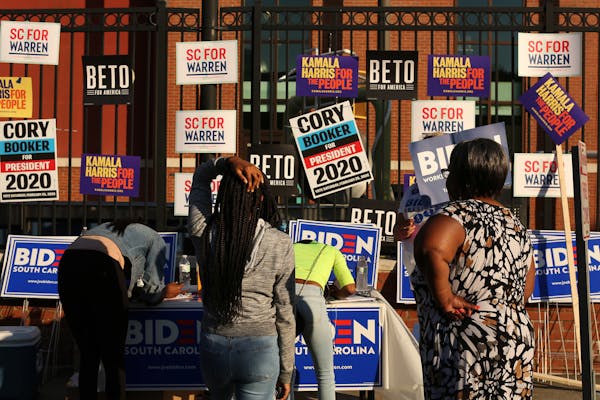A dozen minutes into a debate with U.S. Sen. Amy Klobuchar last October, her Republican opponent went on the attack.
The Minnesota Democrat, Jim Newberger said, "has a 90% rubber-stamp, compliant voting record with her leadership, so when you talk about reaching across the aisle and achieving things … I'm not seeing it."
Klobuchar was ready: She had voted more than 40% of the time with Republican senators from South Dakota, North Dakota and Alaska, she said. "I try to work in the middle with people that want to find actual solutions to things and not just grandstand on them."
Klobuchar, who had debated more than a dozen times since her 1998 run for Hennepin County attorney, easily won a third Senate term a couple weeks later.
The stakes will be higher Wednesday when she debates nine Democratic presidential hopefuls in Miami. Ten more will face off the next night.
It will be Klobuchar's best chance so far to impress a national audience; 24 million people watched the crowded Republican field's first debate on Aug. 6, 2015. The most striking moment came when Fox News' Megyn Kelly reminded Donald Trump that he had called women "fat pigs, dogs, slobs and disgusting animals."
Klobuchar could use a boost in Iowa, which has the first say on the 2020 race at its Feb. 3 caucuses. A Des Moines Register/CNN Poll taken June 2-5 found that she was the choice of 2% of likely Democratic caucusgoers.
Klobuchar has studied 2016 and 2012 Republican debates to prepare for the packed stage. "With so many people tuning in for the first time, the debate is a great opportunity for Amy to share her optimistic economic agenda for America as well as how her approach to foreign policy would differ from Donald Trump," said Justin Buoen, her campaign manager. "She will focus on telling her story and outlining her vision for tackling our country's biggest challenges with urgent action."
Massachusetts Sen. Elizabeth Warren, the highest-polling competitor who will share the stage Wednesday with Klobuchar, has offered a series of policy proposals. The Minnesota Democrat will be prepared to parry Warren's checklist; on Tuesday she unveiled 136 actions she would take in her first 100 days as president.
Klobuchar is "pretty good in terms of not committing … unforced errors," said Michael Dreher, who teaches political communications and is director of forensics, speech and debate at Bethel University.
An exception, he said, came during an April town hall on CNN. When silence greeted Klobuchar's remark that she had carried every Minnesota congressional district including Michele Bachmann's, she said, "That's when you guys are supposed to cheer, OK?"
His advice: Be ready for "gotcha" questions, don't lash out at moderators or opponents and "be true to herself."
Her goal should be to "take all of her policy ideas and wrap them in a theme that gets people interested. It has to be shareable," he said.
It's helpful to have witty rejoinders in mind, Dreher said. For example, he thinks a Klobuchar quip comparing Trump's trade war threats to "poker chips at one of his bankrupt casinos" is effective.
A review of some of Klobuchar's past debate performances reveals some of the ways her style has evolved. In an October 2006 debate at the University of St. Thomas during her first Senate campaign, a moderator chided her nine times for exceeding the time limit for her responses.
The same month on NBC's "Meet the Press," she accused then-U.S. Rep. Mark Kennedy, her Republican opponent, of "political gamesmanship." That phrase also popped up in subsequent debates.
Klobuchar hasn't hesitated to show pique when defending herself. Kennedy accused her in a September 2006 State Fair debate of failing to support U.S. troops fighting overseas. "Of course I support our troops, and I just think that's outrageous that you would imply that I didn't," she said.
The tables were turned in a September 2012 debate in Duluth between Klobuchar and then-Rep. Kurt Bills. After she called one of his positions extreme, he said he didn't understand why "she would have to attack me and call me extreme. I'm a public schoolteacher. How extreme is that?"
Trump's raucous 2016 debates against his Republican rivals and Democrat Hillary Clinton rewrote the rules, said Todd Hering, who coaches the Eastview High School debate team in Apple Valley, which just competed in a national tournament in Dallas.
Trump "was the most visible: different, bombastic, got people talking. Even though what he said wouldn't hold up to scrutiny in a real academic debate, it worked," Hering said.
But he wouldn't advise Klobuchar to emulate the president. She needs a positive message and a new policy idea that generates headlines. And likability is key, he added.
Hering tells his debaters that they should smile because "people will hear your message more when they like you, and it shows confidence."
Eastview High debaters offered some advice to Klobuchar about avoiding mistakes and calming her nerves.
Nikhil Kapur, 17, who will be a senior this fall, said she should bypass memorized lines that come off as "a prepared bit" and pause to mull responses before speaking.
"Go with what you think is right and true," he said. "You're never going to be able to sell an argument that people won't inherently believe."
Harika Thota, 18, who will attend the University of Minnesota this fall, collects her thoughts before competing by "running through in my head things I do know."
Klobuchar, she said, should do one thing if she feels she's being attacked: "Answer the question," because dodging it can make the audience "feel like you're not being genuine."
Judy Keen • 612-673-4234
Former DFL Senate Majority Leader Kari Dziedzic dies of cancer at age 62

How the Star Tribune is covering the 2024 election

Fact check: Walz and Vance made questionable claims during only VP debate

In Tim Walz's home city, opposing groups watch him debate on the national stage

